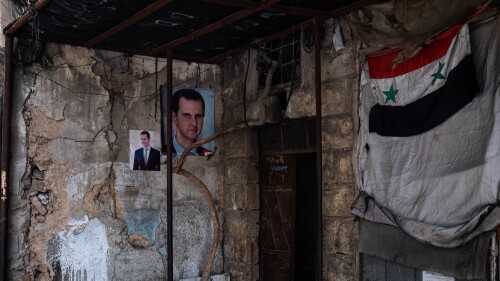In comments to the American Jewish Congress in October 2001, I made the following statement, subsequently quoted on a PBS program:
I worry very much, from the Jewish point of view, that the presence, and increased stature, and affluence, and enfranchisement of American Muslims, because they are so much led by an Islamist leadership, that this will present true dangers to American Jews.
... you must note that this was spoken to a Jewish audience. I make the same point respectively to audiences of women, gays, civil libertarians, Hindus, Evangelical Christians, atheists, and scholars of Islam, among others, all of whom face “true dangers” as the number of Muslims increases.
Of particular note was Sen. Tom Harkin, D-Iowa, who engaged in a long peroration about this comment of mine at a Senate markup on July 23, 2003. Here is a small part of his pompous, self-indulgent and inaccurate statement:
I might just add, Mr. Chairman that this inordinate fear that Mr. Pipes has of the enfranchisement, stature and affluence of American Muslims falls on deaf ears when it comes to this senator. In the state of Iowa, we have the oldest operating mosque in America. The oldest, in my state of Iowa, in Cedar Rapids, Iowa. We have been blessed with a rich diversity in our state of Northern Europeans, we have a huge Jewish population in many parts of our state, and we have Muslims in Cedar Rapids and Des Moines ...
From the deepest part of my body I strongly disagree with Pipes when he says that the very fact of enfranchisement, affluence and assimilation will somehow threaten our values. The opposite is true. They have taken on our American values and have become American Muslims, just like other minorities who have come to this country. They brought their religions. They brought their customs. But they have Americanized.
I remember as a young child going to my small Catholic Church in my small community with my mother who was an immigrant who could barely speak English. On certain feast days my mother liked to wear the clothes of her native land. These were not the normal clothes that one would wear in a small town in Iowa. And I can remember people making fun of her.
So when Mr. Pipes makes statements like this, I think about my mother. Sure, she talked funny. Maybe she didn’t dress like everyone else did. She wanted to bring some of her customs with her to this country. But anyone who knew my mother could never deny that she was American to the core.
Life used to be easy for French Jews until very recently. The mere fact that so many Jews had gathered in one single country helped a lot. In 1939, there were about 350,000 Jews in France. By 1945, one third of them had perished (a comparatively low rate by Holocaust standards). Postwar late arrivals from Eastern Europe and the refugee influx from Islamic countries brought about a new, younger community of about 700,000 souls – or close to 1 million, if one is to include the outer fringe of very assimilated Jews. A critical mass was thus reached, allowing for Jewish books, kosher food, Jewish education, Orthodox revival, Reform or Conservative congregations, youth activities, Zionism.
French Jews were poised for a Golden Age.
The fall, over the past three years, has been all the more breathtaking. The major reason for it is quite simple: The Jewish critical mass effect has clashed with a parallel critical mass effect – the rapid rise of a huge immigrant Islamic community, 10 or 12 times as strong as the Jewish community in number (estimates range from 6 to 8 million). In a perfect, ideal world, both groups could live together and integrate together into the larger French society. In the real world, Jews tended to sympathize for a while with the Muslims as fellow immigrants, and Muslims tended to reject Jews as Jews and Zionists.
More than 20 synagogues and schools have been set on fire. Jewish children and Jewish teachers are routinely harassed at school. Rabbis are beaten or spat at in the street. An Islamic preacher who singled out liberal Jewish intellectuals – supporters of the Geneva Accord, actually – as dangerous “Jewish nationalists” has turned into a media icon. One or two recent murders in Paris may even be ascribed to anti-Semitism. And above all, the nation’s elite has been strangely reluctant to admit there is something wrong going on.
It took a year for the press to report seriously on this phenomenon. It took much more time for the government to respond. For any Jewish person with common sense and insight, the writing is on the wall.
There is no certainty that the French pattern (or, for a yet more extreme example, the Danish one) will recur in the United States, and I certainly hope it will not. But present trends (political attitudes, anti-Semitic statements, attacks on synagogues) suggest that the American pattern is indeed following the French one. The Islamist leadership I pointed to is very much in charge, the mood is hostile and problems are multiplying.
The Harkins of the world can note these trends and address them, taking steps so that the Muslim population of the United States does truly assimilate and fit in – or they can stick their heads in the sand and pretend that all is well when it so obviously is not. The choice is theirs. But I stand by my words. More than that, I put them on notice that they have been warned.







